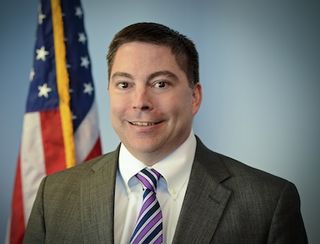FCC's O'Rielly: Internet Access Not a Necessity

FCC commissioner Michael O'Rielly says that regulators should not view Internet access as a necessity or a human right.
That was among five principles for approaching a regulator's role—that would be his role—in the broadband economy, which he outlined Thursday (June 25) in a speech at the Internet Innovation Alliance, according to a copy of the speech supplied by the commissioner's office.
Principle number four, which he said helped guide his approach to broadband regulation, was: "Internet access is not a necessity or human right."
O'Rielly said he was not trying to diminish the significance of the Internet and that he recognized how important it was in people's lives. But he suggested that it should not be conflated with "food, shelter and water" and that putting broadband in that group was a rhetorical trap.
"It is important to note that Internet access is not a necessity in the day-to-day lives of Americans and doesn’t even come close to the threshold to be considered a basic human right," he said. "People can and do live without Internet access, and many lead very successful lives."
And don't even try to suggest it is a basic human right.
FCC Chairman Tom Wheeler has signaled how necessary he feels Internet access is to American's everywhere.
Broadcasting & Cable Newsletter
The smarter way to stay on top of broadcasting and cable industry. Sign up below
"It is even more ludicrous to compare Internet access to a basic human right," said O'Rielly. "In fact, it is quite demeaning to do so in my opinion. Human rights are standards of behavior that are inherent in every human being. They are the core principles underpinning human interaction in society. These include liberty, due process or justice, and freedom of religious beliefs. I find little sympathy with efforts to try to equate Internet access with these higher, fundamental concepts."
Then Secretary of State Hillary Clinton certainly suggested as much when she added Internet Freedom to other freedoms the protection of which the State Department advocated as baseline policy positions.
"From a regulator’s perspective," said O'Rielly, "it is important to recognize the difference between a necessity or a human right and goods such as access to the Internet. Avoiding the use of such rhetorical traps is wise."
O'Rielly's other four regulatory principles were: "The Internet cannot be stopped," "Understand how the Internet economy works," "Follow the law; don’t make it up," and "The benefits of regulation must outweigh the burdens."
Contributing editor John Eggerton has been an editor and/or writer on media regulation, legislation and policy for over four decades, including covering the FCC, FTC, Congress, the major media trade associations, and the federal courts. In addition to Multichannel News and Broadcasting + Cable, his work has appeared in Radio World, TV Technology, TV Fax, This Week in Consumer Electronics, Variety and the Encyclopedia Britannica.

